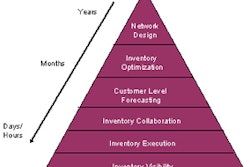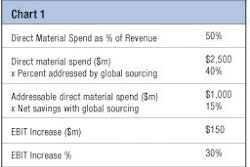Boston — November 21, 2006 — The market for continuous improvement (CI) systems had total hardware, software and services revenues of more than $200 million in 2005, and it will nearly double by the end of 2010, with a strong compounded annual growth rate (CAGR) of 12.7 percent driven in large part by strong competitive pressures and successes with CI solutions, research firm ARC Advisory Group has reported.
Globalization is exerting extraordinary pressure on manufacturers, causing most to adopt continuous improvement programs. The primary CI programs are Lean Manufacturing and Six Sigma. Many also use Total Quality Management (TQM) and Theory of Constraints (TOC).
"A corporation's business processes are embedded in their software systems. As they adopt Lean Manufacturing and Six Sigma, they increasingly need systems tailored to these programs," said Research Director Ralph Rio, the principal author of ARC's "Continuous Improvement Systems Worldwide Outlook."
Tipping Point
The market for CI systems is diverse in terms of the quantity of suppliers and the breadth of improvement methodologies that they support. ARC's survey of manufacturers shows that 80 percent of them have adopted a continuous improvement program. Many of these manufacturers have gained the experience they need and are ready to augment their programs with CI systems.
The market has recently experienced an increase in growth that ARC has forecasted to continue for at least the next five years. This is a critical time for the market suppliers as CI systems have clearly passed through the tipping point of acceptance.
ARC writes that CI programs increase business performance by involving a broad range of people, methods and technologies. Over time, a series of small improvements cumulate and compound into a huge improvement. Each program provides a focus and repeatable methodology for implementing a large number of these incremental improvements.
Technology Enhances CI
Many manufacturers are using technology to enhance their program's effectiveness. Abundant, well published successes provide executives with the confidence to invest in CI systems.
The ARC study examines the market for applications that manufacturers use to bring their programs to a new level of performance. The types of applications include electronic Kanban (eKanban), statistical process control (SPC), finite capacity scheduling (FCS), advanced planning and scheduling (APS), overall equipment effectiveness (OEE), TQM and value stream mapping (VSM).
The CI systems market has a multitude of participants that range from small, start-up, best-of-breed companies to established, multi-billion dollar suppliers. Sixty-nine of the suppliers are profiled in the ARC study.
Globalization is exerting extraordinary pressure on manufacturers, causing most to adopt continuous improvement programs. The primary CI programs are Lean Manufacturing and Six Sigma. Many also use Total Quality Management (TQM) and Theory of Constraints (TOC).
"A corporation's business processes are embedded in their software systems. As they adopt Lean Manufacturing and Six Sigma, they increasingly need systems tailored to these programs," said Research Director Ralph Rio, the principal author of ARC's "Continuous Improvement Systems Worldwide Outlook."
Tipping Point
The market for CI systems is diverse in terms of the quantity of suppliers and the breadth of improvement methodologies that they support. ARC's survey of manufacturers shows that 80 percent of them have adopted a continuous improvement program. Many of these manufacturers have gained the experience they need and are ready to augment their programs with CI systems.
The market has recently experienced an increase in growth that ARC has forecasted to continue for at least the next five years. This is a critical time for the market suppliers as CI systems have clearly passed through the tipping point of acceptance.
ARC writes that CI programs increase business performance by involving a broad range of people, methods and technologies. Over time, a series of small improvements cumulate and compound into a huge improvement. Each program provides a focus and repeatable methodology for implementing a large number of these incremental improvements.
Technology Enhances CI
Many manufacturers are using technology to enhance their program's effectiveness. Abundant, well published successes provide executives with the confidence to invest in CI systems.
The ARC study examines the market for applications that manufacturers use to bring their programs to a new level of performance. The types of applications include electronic Kanban (eKanban), statistical process control (SPC), finite capacity scheduling (FCS), advanced planning and scheduling (APS), overall equipment effectiveness (OEE), TQM and value stream mapping (VSM).
The CI systems market has a multitude of participants that range from small, start-up, best-of-breed companies to established, multi-billion dollar suppliers. Sixty-nine of the suppliers are profiled in the ARC study.












